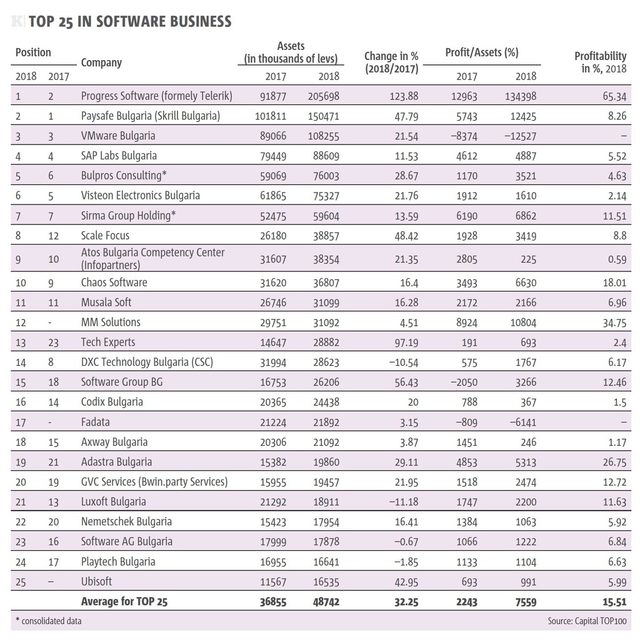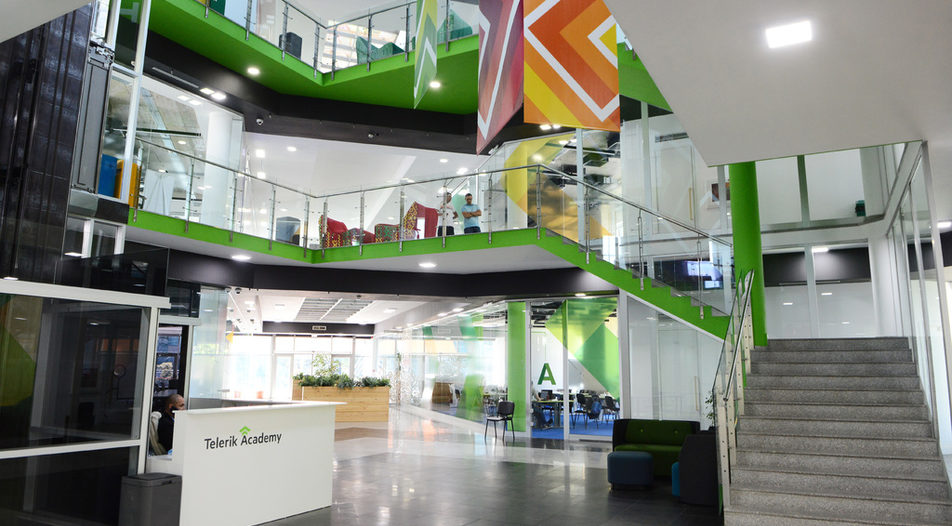| Accent |
|---|
| High wages, a red-hot labour market, record revenue and profit growth - the IT sector is the indisputable leader of Capital´s sector rankings |
The Bulgarian economy's eternal island of optimism - the software sector, continues to steadily march forward and is now responsible for over 3% of Bulgaria´s GDP. Data from 2018 shows that there are no reasons to dampen this optimism. On the contrary, it seems more justified than ever. All the companies from the IT Top 10 reported double-digit revenue growth; some companies from the Top 25 skyrocketed by almost 100%, while the average growth performance of all companies in the sector topped 32%. The year was great for-profits too, with average growth exceeding 15%. In a nutshell, the software business is the outright champion across all 12 of Capital's sector rankings for 2018. The 25 largest IT companies alone account for 1% of Bulgaria's GDP.
The big picture reveals an interesting trend. All the company representatives contacted by Capital reported an expectation for further hires in the short term. At the same time, they also complained about a lack of qualified personnel and the overheated labour market. This is nothing new and continues in 2019. But in spite of that chronic labour malaise, growth has not stalled.
Reshuffle at the top
This year´s ranking is topped by Progress Software (the new name of Telerik, purchased by the US-based Progress in 2014). This reshuffle, however, comes with a caveat. Progress Software recorded a revenue increase of 123% or 205 million levs, but this giant leap was mostly the result of a one-off sale of non-material assets. Until now, the company had reported a steady growth of 20% per year. As recorded in its annual report, actual revenue from software amounted to about 100 million levs, which would place the company in 3rd spot. The financial operation with the owner made the company phenomenally profitable, with 65%.
Yogesh Gupta, the CEO of Progress, explained that he cannot provide more details on the deal because the company is public and is the subject of regulations that forbid such disclosures.
"Our main business activity is robust and we are working on innovations that will in the future continue to deliver results for the company, our clients and shareholders. For us, 2018 was important in a number of ways. We laid the foundations for the deployment of several new and important versions of our products, the effects of which we are already feeling."
Mr. Gupta added that from the standpoint of the company's Bulgarian operation, the most important event was the opening of its new office and the intention to continue investing in the local team.
Number 2 in the ranking was Paysafe Bulgaria, the Bulgarian branch of the global payment software company Paysafe Group. It recorded a more than impressive 47% growth and its revenue surpassed 150 million levs. These numbers almost certainly mean that Paysafe will retake the top spot in 2019.
Miroslav Bozhilov, general manager of Paysafe Bulgaria, commented for Capital that over the past year the number of employees in Sofia exceeded 1000 and the capital will continue to be the principal software centre for the company´s products.
"Our local success is tied to the company's good performance on the global stage and the ever-growing popularity of e-wallets as a payment method," said Mr. Bozhilov. "The popularity of our product Skrill keeps increasing with the addition of new functions, which are mainly developed in Sofia," he added.
Just like last year, the 3rd spot is occupied by VMware Bulgaria, the local branch of US-based VMware. The company's revenue reached 108 million levs and 21% yearly growth. The bad news for VMware is that it was one of two companies (together with Fadata) that did not operate at a profit.
"The year was very successful for VMware's office in Bulgaria. We continued to develop and enlarge our teams in Sofia with a focus on development and business operations," commented Diana Stefanova, managing director of the company´s development centres for Europe, the Middle East and Africa. ¨We are seeing increased interest in the so-called hybrid technologies, where we are one of the foremost business solution suppliers," she added. In order to expedite the process, the company has acquired Heptio, which represents an open code cluster management platform.
Fourth place went to SAP Labs Bulgaria, the local branch of German software company SAP. Its revenue reached 88 million levs, but the revenue growth of 11% was the slowest in the Top 10. The company´s managing director Radomir Milanov told Capital that the steady double-digit growth trend in financial indicators has continued.
"We significantly increased the percentage of clients who chose to use our new platforms for HR management, customer experience and the creation of holistic processes for shipping and logistics. We measure our success precisely by the amount of added value that we offer our clients."
Number 5 in the ranking is a Bulgarian-owned company. Bulpros Consulting has continued to maintain an impressive growth tempo. Over the past year, the company´s consolidated revenue reached 76 million levs, which is more than double the 2016 revenue of 32 million levs. Bulpros is establishing itself as the biggest player on the software market that is not a branch of a major international company. Ownership here may change hands in the coming years, since it is time for the venture funds that backed the company to capitalize their investments.
"Our success last year was down to our expansion strategy. We opened new offices, the last of which were in Barcelona and Belgrade. We have increased our activities in the US, while Germany remains our main market," commented Ivaylo Slavov, managing director of Bulpros. "Our strategic expansion plan already includes markets like Israel, Singapore and Thailand."
Visteon Electronics Bulgaria and Sirma Group Holding took 6th and 7th place, respectively. The bottom half of the Top 10 has seen more changes. Scale Focus climbs up 8th spot with 38 million levs revenue, while Atos Bulgaria and Chaos Software swap places. They all reported double-digit revenue growth.
Aside from the Top 10, the most impressive participant in the ranking is Tech Experts, which is an international software company registered in Bulgaria. Its revenue exceeded 28 million levs, which is a significant growth considering that two years ago the revenue was just over 11 million levs. Lachezar Lozanov, Tech Experts' manager for Bulgaria and Malta, commented for Capital that the company has more than 800 employees in Sofia and is expanding its client services portfolio. "Bulgaria turned out to be a successful location and a large portion of our global team is here," he added.
The well-known problem
All representatives of the largest software companies are united in what they see as the biggest challenge of the past year. It is extremely familiar - the supply of qualified labor lags behind the sector's constant growth.
"The overheated job market is the number one problem for every software company on the planet, but last year it turned into an epidemic for the entire economy of Bulgaria, especially in the big cities," said Elena Marinova, president of Musala Soft.
According to Ivan Georgiev, financial manager at Fadata, the difficulty of finding suitable personnel is magnified by the company's expansion plans. "We made and continue to make considerable investments in the recruitment of new people, product development and resource availability, in order to position ourselves as market leaders," he added.
Radomir Milanov from SAP commented that the company strives to attract employees who make the Bulgarian market their sole focus, which "can often be a difficult task". He added that finding highly qualified staff is a problem not just for SAP, but also for other companies and even industries. "That was one of our biggest challenges last year, because we insist on maintaining excellent employees."
Ivaylo Spasov from Bulpros cited the same issue. "We invest in different initiatives that mainly aim to develop young talent. We also support activities that attempt to bring Bulgarian specialists back from abroad, as well as motivate foreign nationals to choose Bulgaria to work and live in."
Lachezar Lozanov from Tech Experts gives an identical answer when asked about last year´s challenges. "The sector's labor market is highly competitive, so finding employees is not the main difficulty just for us." He added that over the next few months the company is hoping to fill 250 new positions in Sofia alone.
Justified optimism
2018 was yet another successful year for the largest companies in the IT sector and the leaders remain optimistic. A quick glance at their performance reveals that 19 of the Top 25 have increased their number of employees in the past year, revenue growth has been considerable, while negative financial results were an exception.
If there´s anything to dampen the optimism of IT companies, it is that Bulgaria is as yet unable to produce as much IT personnel as necessary. This is unlikely to change in the coming years. Even with that problem in tow, the impressive revenue growth and the numerous new hires make the IT sector one of the largest islands of optimism in the Bulgarian economy.

| Accent |
|---|
| High wages, a red-hot labour market, record revenue and profit growth - the IT sector is the indisputable leader of Capital´s sector rankings |
The Bulgarian economy's eternal island of optimism - the software sector, continues to steadily march forward and is now responsible for over 3% of Bulgaria´s GDP. Data from 2018 shows that there are no reasons to dampen this optimism. On the contrary, it seems more justified than ever. All the companies from the IT Top 10 reported double-digit revenue growth; some companies from the Top 25 skyrocketed by almost 100%, while the average growth performance of all companies in the sector topped 32%. The year was great for-profits too, with average growth exceeding 15%. In a nutshell, the software business is the outright champion across all 12 of Capital's sector rankings for 2018. The 25 largest IT companies alone account for 1% of Bulgaria's GDP.












